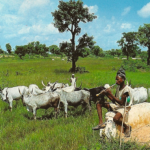‘Despite exiting recession, food prices remain high’

Few months after the National Bureau of Statistics (NBS) announced to the delight of Nigerians, prices of food items have continued to hit the rooftops.
Consequently, Nigeria’s annual inflation rate marginally slowed for an eighth- month record in September, easing to 15.98 per cent, the National Bureau of Statistics (NBS) said on Tuesday, in its latest publication of the Consumer Price Index.
This was 0.03 per cent points lower than the rate recorded in August (16.01) per cent making it the eighth consecutive decline in the rate of headline year on year inflation since January, 2017.
However, the food price index showed a marginal rise in inflation at 20.32 per cent in September, up from 20.25 per cent in August.
“The rise in the index was caused by increases in prices of potatoes, yams and other tubers, milk cheese and eggs, bread and cereals, coffee tea and cocoa, soft drinks, fish, meat and oil and fats,” NBS said.
Increases were recorded in all COICOP divisions that yield the Headline Index.

On a month-on-month basis, the Headline index increased by 0.78 per cent in September 2017, 0.19 per cent points lower from the rate of 0.97 percent recorded in August.
The percentage change in the average composite CPI for the twelve-month period ending in September 2017, over the average of the CPI for the previous twelve-month period, was 17.17 per cent, showing 0.16 per cent point lower from 17.33 per cent recorded in August 2017.
The Urban index rose by 16.18 per cent (year-on-year) in September 2017, up by 0.05 per cent point from 16.13 per cent recorded in August and the rural index increased by 15.81 per cent in September, down from 15.91 per cent in August.
On month-on-month basis, the urban index rose by 0.84 per cent in September 2017, down from 0.99 per cent recorded in August, while the rural index rose by 0.74 per cent in September 2017, down from 0.95 per cent in August.
The corresponding twelve-month year-on-year average percentage change for the urban index decreased from 18.15 per cent in August to 17.87 per cent in September, while the corresponding rural inflation rate in September was 16.52 per cent compared to 16.58 per cent recorded in August 2017.
Food price pressure continued into September, as all major food sub-indexes increased. The Food Index increased by 20.32 percent (year-on-year) in September, up marginally by 0.07 per cent points from the rate recorded in August (20.25 percent).
The rise in the index was caused by increases in prices of potatoes, yams and other tubers, milk cheese and eggs, bread and cereals, coffee tea and cocoa, soft drinks, fish, meat and oil and fats.
On a month-on-month basis, the Food sub-index increased by 0.87 percent in September, down from 1.14 percent recorded in August.
The average annual rate of change of the Food sub-index for the twelve-month period ending in September 2017 over the previous twelve -month average was 18.88 per cent, 0.31 per cent points from the average annual rate of change recorded in August (18.57) per cent.
The ”All Items less farm produce” or Core sub-index, which excludes the prices of volatile agricultural produce eased further during the month of September to 12.10 per cent points from 12.30 per cent recorded in August as all key divisions, which contribute to the index increased.










